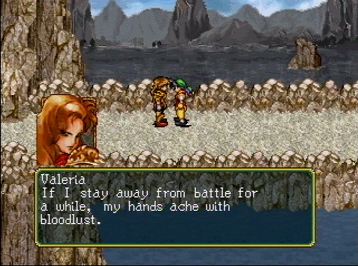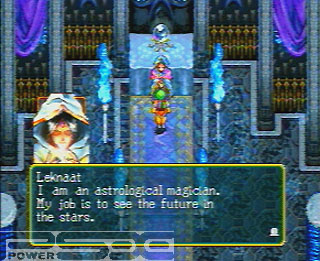|
|

|
BATTLE SYSTEM
|

|
INTERACTION
|

|
ORIGINALITY
|

|
STORY
|

|
MUSIC & SOUND
|

|
VISUALS
|

|
CHALLENGE
|
Easy
|
COMPLETION TIME
|
15-25 hours
|
|
OVERALL
4.5/5
|
Rating definitions
|
|
|
Most RPGs claim to be epic. Most RPGs simply follow a hero and his/her half dozen tag-a-longs as they single-handedly free the world, defeat the evil sorcerer, etc. Few RPGs actually allow for hundreds of playable characters, epic battles with vast armies, or one-on-one duels to the death. Suikoden does all this and more.
Suikoden is the first in a series of RPGs that all take place at different times within the same world. Central to the premise is the concept of the 108 Stars of Destiny as adapted from the classic Chinese novel Shui Hu Zhuan (Outlaws of the Marsh). The main character is the “central” star who gathers about him the other 107 stars in order to overthrow an evil and corrupt government. He travels about the countryside, gaining support and unifying the population into a liberation army. The ultimate plot is easily deduced after a few hours of gameplay but is well-executed and enjoyable with a few minor twists to surprise players.
Suikoden follows a basic turn-based RPG style for most of the game. The hero is always in the party and can have up to five allies in the active party. The party is comprised of various characters who the hero recruits, ie the 108 stars. Various portions of the story force certain characters into the party for a short amount of time, but the player is always left with an almost overwhelming choice of who should be included to fill the party. Not all 108 stars are playable, but the vast majority is playable, and each star comes with his/her own strength and weakness.
 Back Off... Slowly...
Back Off... Slowly...
|
|
Characters that have a relationship to one another can sometimes perform unique “unite” attacks to inflict extra damage. Magic is performed by the usage of crystals which can be transferred between characters. The game also has a “free will” command which basically tells everyone to attack something – great for easy battles that do not necessarily need strategy.
The leveling system is designed to allow a weak character to quickly catch up to the stronger characters (ie, the hero) without needless fighting. The enemy’s level has a direct impact on the amount of experience gained: strong monsters give weak characters many experience points, but do not give nearly as many points to strong characters. This allows a party to equalize quickly and efficiently.
Suikoden features several relatively unique aspects outside of the traditional RPG paradigm. During the flow of the game, the hero is allowed to direct massive battle sequences, but a detailed knowledge of military tactics is unneeded. Tactics are basically rock-paper-scissors except with charge-magic-bow instead. The player will also have the opportunity to fight one-on-one duels that are completely different from normal battles.
The hero also gains a headquarters (castle) early in the game which serves as a resting place for the portion of the 108 stars who are not gallivanting about the countryside with the hero. As the hero recruits more characters, the castle becomes larger and eventually offers all the services of any good town plus much more.
 Astrological Magician? Like an Astrologist?
Astrological Magician? Like an Astrologist?
|
|
The game itself is fairly easy as the hero and company usually greatly overpower any enemy they face. Much of the challenge will come from trying to recruit all 108 stars (some are very obscure) or trying to achieve the “perfect” ending. Unfortunately the clumsy menu systems impair players’ ability to quickly perform routine maintenance. Upgrade prices quickly skyrocket – imagine trying to outfit eighty something characters with good armor. Even if the player does not wish to upgrade everyone, the characters that are forced on the player often need enough upgrading that cash-flow becomes a problem. Numerous typos, sound glitches, and translation oddities indicate that the game could have used a longer testing period.
Visually, Suikoden is sprite-based and offers a solid graphics scheme. This isn’t the high-point of the game, but the graphics do provide an adequate framework for the game-play. The soundtrack is also good and features tunes that accurately reflect the atmosphere.
In terms of replayability, Suikoden doesn’t feature drastic ending differences or different storylines. There are enough minor collections within the game to keep perfectionists quite busy, and finding any stars missed the first time around would certainly be good replay motivation. As an added twist, owners of Suikoden II can import save data (including some character levels). Further, the plots of Suikoden I and II are closely intertwined so it may be worthwhile to replay I right before II, especially since I can be completed quickly.
Ultimately, Suikoden comes highly recommended for all RPG-lovers. Though it does have its share of detractions and suspensions of belief (the hero is the ultimate charisma-man), solid game-play and unique features combined with a good story make Suikoden one of the better early era PS1 RPGs.
Review Archives
|









